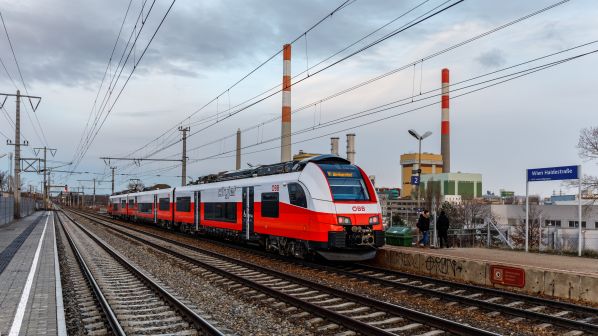AUSTRIAN Federal Railways (ÖBB) broke even in 2020 despite a €700m drop in revenue from the Covid-19 pandemic, due to the implementation of cost saving measures and the introduction of the government’s railway support package.
ÖBB says it was able to reduce costs by around €380m, with this supplemented by funding from the federal government to help the rail sector. All ÖBB subsidiaries returned an even result, with a final group earnings before tax (EBT) of €59m, down from €169m in 2019.
Total group income for 2020 was €6.72bn, down from €6.94bn in 2019, while the cost of materials and services purchased was €1.69bn, down slightly from €1.78bn in 2019. Personnel expenses were €2.74bn, level with 2019. Other operating expenses were €439m, down from €476m in 2019.
Ebitda was €1.85bn, down from €1.95bn, and Ebit was €625m, down from €755m.
“2020 was a tough year, which of course also posed enormous challenges to ÖBB,” says ÖBB chairman, Mr Andreas Matthä. “We put countermeasures in place very quickly and navigated through the crisis consistently right from the start. The option of short-time work and the federal government’s prudent railway package of around €200m - in the form of emergency contracts on the western line, additional orders and a reduction in rail access charges - have enabled us to break-even in 2020.”
“The marginally positive EBT is important especially with regard to ensuring the investment capacity of the entire ÖBB Group,” says ÖBB chief financial officer, Mr Arnold Schiefer. “This enables us to secure not only the trust of the financial markets, but also the most attractive financing conditions possible. After all, we are making investments of over €25bn in the coming years leading up to 2026.”
ÖBB continued to offer services for essential workers throughout the pandemic, carrying 286.5 million passengers, 190 million less than the year before. This included 142.2 million on long distance services, 20.6 million on commuter and 123.7 million on Postbus services. Passenger numbers dropped by more than 90% at the height of the pandemic, with an annual decline of 40%, equivalent to patronage last seen at the end of the 1980s.
ÖBB’s Rail Cargo Group (RCG) carried 95 million tonnes of freight over the year, both across Austria and internationally, including from raw materials for industry to consumables such as pasta, tomato sauce and toilet paper.
More than €2.6bn was invested in the renewal and expansion of rail infrastructure in 2020. The roughly 200 ÖBB-Infrastructure construction sites continued to operate for most days during the pandemic, securing jobs throughout the supply chain.
The federal government adopted a 2021-2026 framework plan worth €17.5bn last year, which will create €5bn in value annually for Austria as a business location and secure or create 15,000 jobs for every billion invested.
“Despite all adversities, all three subgroups managed to break even,” Matthä says. “To achieve these results, the group needed to move at different speeds in the crisis in 2020; we put the brakes on costs in passenger and freight transport while continuing to accelerate in infrastructure development. This was a major contribution by ÖBB to keeping the Austrian economy running.”
ÖBB says the challenges it faces will continue in 2021, but the operator says it intends to pick up speed again as the population is vaccinated and normality gradually returns.
The railway has put in place a comprehensive investment plan worth more than €25bn for 2021-26, with €20.6bn earmarked for the expansion of rail infrastructure and renewable energies. Another €3.4bn is being invested in the modernisation and expansion of the passenger train fleet. Investments are also being made in new night trains to expand the ÖBB Nightjet network.
“In the night train segment, we want to once again significantly expand our pioneering role in Europe,” Matthä says. “We will resume the established programme at the beginning of the summer - for example to Rome, Venice, Milan, Livorno. We are introducing Amsterdam as a new destination, and Paris will finally be added at the end of the year.”
Around €1.5bn will be invested in the digitalisation of the railway system over the next six years. This includes the graphic seat reservation project and the multi-modal Wegfinder app, coupled with the ÖBB360° first and last mile scheme, which are intended to make passenger transport more customer friendly.
In the infrastructure sector, work is underway to develop a “digital twin” of the ÖBB network in order to manage maintenance and network utilisation more efficiently and cost-effectively. End-to-end digitalisation is also expected to make freight transport by rail faster and more efficient.

